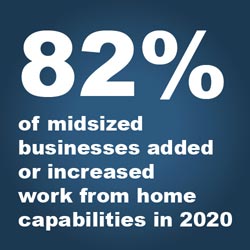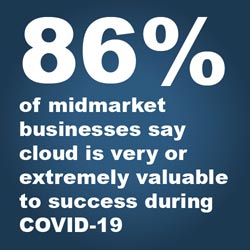Making the most of financial downturn and meeting the challenges of work from home.
Of course the answer to the key question here depends on your business. However, businesses who invest in technology now are more likely to grow, according to research from SMB Group. So now might be the right time to invest in IT.
About 41% of midmarket businesses in the U.S. reported declining revenue between March and July last year due to COVID-19, according to survey results SMB Group. Adding to that, many businesses had to pivot to remote work and change their business model overnight.
Now more than ever technology has become critical to business success, not only to meet the minimum requirements of teleworking, but to make a business more agile and drive strategic management.
“Even before the pandemic, the role of technology was increasingly intertwined with business success,” said SMB Group. “As what’s ‘normal’ recedes into the rearview mirror, we don’t know exactly what the next ‘normal’ will look like. Midmarket firms should consider the shifts already underway, how they are evolving, and what new trends are emerging at macro, regional or industry levels.”

82% of midmarket businesses had to implement or expand work from home capabilities in 2020.
While cash reserves remain depleted for many businesses, emerging challenges and opportunities suggest that now is a good time to think about investing in technology. Businesses that have accelerated their technology investments over the last year are 77% more likely to increase revenue, according to SMB Group’s analysis.

Luckily, we live in the era of cloud and subscriptions licensing. This means businesses don’t have to invest loads of capital upfront to implement new solutions to new challenges.

86% or more of survey respondents rated cloud solutions as extremely or very valuable in helping them to weather the COVID-19 crisis.
Meeting Challenges of Work from Home
The challenges of working from home are not exactly a secret: communication gaps, limited accessibility to business systems, security vulnerabilities and strained internal IT teams. Here’s how to meet these challenges.
Virtual Desktop Hosting
There’s probably no other solution that is more important than desktop virtualization for making teleworking successful in your back office operations.
For desktop virtualization there are three main options: VPN, VDI, and RDS. You can learn more about the differences between these options here: VPN vs. VDI vs. RDS. But in short, Virtual Desktop Integration (VDI) tends to be the most robust. Virtual Private Networks (VPNs) are a bit outdated in terms of performance and security. Remote Desktop Services (RDS) falls somewhere between.
Desktop virtualization, especially VDI, gives your team a seamless experience and allows them to access the tools they need to their job from anywhere there is an internet connection. Learn about the benefits of Desktop Virtualization here.
Desktop as a Service (DaaS) and virtual desktop hosting are methods for virtualizing your desktop by outsourcing the hosting maintenance to a third-party hoster.
How Virtual Desktop Hosting Helps
As we mentioned above, many businesses are facing shrinking revenue and reduced operating capital. Building a virtual desktop environment in-house requires major upfront capital spending on hardware (servers). Maintaining them requires specialized IT staff and can be costly and difficult. Going through a third-party will not only be more practical financially, it will likely be more successful because it allows your internal IT team to focus on mission critical and customer facing technologies. Perhaps more importantly, a private cloud hosting provider’s core business includes expertise in the following:
- Dependency mapping
- Network monitoring
- Server monitoring
- Storage monitoring
- Power monitoring
- Application monitoring
- Provisioning and monitoring
- Root cause analysis
- Log management
- Security and backup
- Alerting and reporting
Keep in mind that your system availability and security is the priority for any cloud hosting solution provider. Their entire business depends on their ability to deliver these.
Critical Application Hosting
Similar to virtual desktops, a cloud hosting provider can deliver your existing systems in the cloud. For example, if your accounting team is using an Enterprise Resource Planning solution, you don’t need to implement a brand-new solution to go cloud. A private hosting provider can move the system to the cloud. The right provider will also allow you to keep your current software integrations, such as Customer Relationship Management, Expense Management, Payroll and more. Some of the key benefits of using a hosting provider for your critical back office apps include:
- Smoother Change Management
- Keep Your Customizations
- Save on Upfront Expenses
- More Control
- Get a Trusted Cloud Partner
- Learn more
What to Look for in a Hosting Provider
Not all hosting providers are created equal. First and foremost, you want a hoster who can deliver expert support. Other key things to look for include:
- Live, US-Based, 24/7/365 Support
- Patches and Updates Included
- Private Cloud with Dedicated Servers, Including Automated Failovers
- Performance Management
- Security Monitoring
- Daily, Off-Site Backups Included
- Disaster Recovery available
- Your data is accessible anywhere, from any device, anytime
- Eliminate On-Premise Servers, Software Licenses (SQL, Office, Exchange, etc.)
Curious About Private Cloud Hosting? Check out how affordable CyberlinkASP is for you.
Learn About Our Pricing

